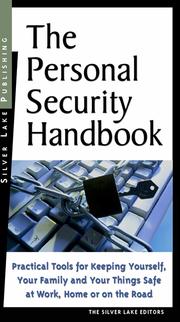
The Personal Security Handbook
By Silver Lake Editors
Subjects: Accidents, Prevention, Home accidents, Dwellings, Current Events, Nonfiction, Emergency management, Identity theft, HEALTH & FITNESS, Safety measures, Health & Fitness, Nutrition, Safety education, Automobiles, Theft, Safety, Kidnapping, Security measures, Security (Psychology), First aid in illness and injury, Computer security, Family & Relationships, Travel, Crime prevention
Description: Silver Lake Publishing’s bestselling book THE PERSONAL SECURITY HANDBOOK: Practical Tools for Keeping Yourself and Your Valuables Safe at Work, Home or on the Road translates political theories into concrete actions.The book makes the point that American homeland security policy presumes that most citizens can take care of themselves for at least 72 hours after a major disaster damages—or destroys—standard infrastructure. It focuses on giving people the tools they need to survive those first 72 hours.Specifically, the book includes extensive checklists for making disaster preparations. Whether the disasters in question are natural or man-made. Here are some of the key points:Preparing Your Family1. Store a three-day supply of water (one gallon—two quarts for drinking, two quarts for food prep and cleaning—for each member of your household...including pets) 2. Store a three-day supply of basic dry food—crackers, snack bars, dried fruit, dried meat—so that each member of your household (including pets) can eat something every 4 to 6 hours3. Keep a complete first-aid kit (the book includes a detailed list of items that should be in this kit) in your home…and at your work4. Keep one battery-powered radio or TV for the household and at least two extra sets of batteries for this device 5. Keep one battery-powered flashlight for each member of your household. 6. Establish a least two escape routes from your neighborhood—in case you’re separated during an evacuation—with everyone in your household 7. Establish a safe contact (often a relative or friend) outside of your immediate area that household members can contact or where you can meet in case of separationPreparing Your Home1. Check for any loose electrical wiring or shaky gas connection—inside and outside. Repair them personally, if you can; call a contractor, if you can’t. 2. Look for any loose structures (patios, porches, carports, fences, etc.) outside of your house. Secure them or remove them. 3. Fasten shelves and hanging units inside your house; place heavier items on lower shelves. 4. Make sure pictures, mirror and other such items are hanging away from beds or couches. If they’re nearby, take them down. 5. Make sure your water heater is strapped to wall studs or other solid bases.The government’s civic duty argument assumes—optimistically—that individual preparedness has a cascading effect. If gas stations keep power generators on hand, they can pump fuel for commuters to drive to work. If utility company employees can get to work, they can provide power to grocery stores. Once grocery stores are open, households can restock food, water and first aid needs while emergency responders focus on people who can’t get their own.
Comments
You must log in to leave comments.